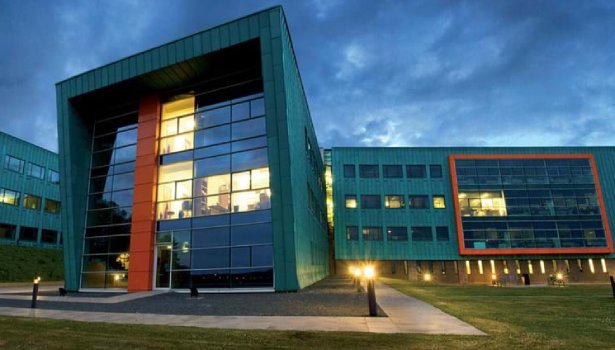Nuclear Catalyst
Designed to guide ambitious business leaders across Cumberland with a drive to transform the nuclear sector.
Designed to guide ambitious business leaders across Cumberland with a drive to transform the nuclear sector.


Lancaster University continues to pioneer nuclear research, channelling over twenty-five years’ expertise. If you’re a leader looking to evolve your business by fuelling innovations across the nuclear sector, read on.
The Nuclear Catalyst is designed exclusively for small and medium-sized enterprises around Cumberland, with an aim to harness the expertise of academics and forward-thinking peers by tackling challenges across the nuclear landscape. From developing advances in nuclear decommissioning and safety to next-gen energy storage solutions, our goal is to co-create an outstanding local model for evolutions in nuclear efficiency.
This project is part-funded by the UK government through the UK Shared Prosperity Fund. The Data Catalyst is designed and delivered by Lancaster University as part of the Lancashire Universities Innovation Programme in partnership with Preston Council.
Start Date: 4th November 2025
Enquiry
The Cumberland Council Plan (2023-2027) had identified the nuclear sector as a key strategic asset, enabling economic growth, skills development, and community wealth. The council’s wider goals around sustainability, low carbon transition, and building resilient local economies strongly indicate that nuclear will continue to play a central role in shaping Cumberland’s future.
The Nuclear Catalyst intends to play a major part in fulfilling this plan, providing three collaborative sessions between Cumberland businesses and Lancaster University academics. We believe in co-identifying problems to co-create solutions:
The design of the Nuclear Catalyst draws on our extensive expertise and success over the past 20 years in facilitating business transformation. Furthering our commitment to evolving local objectives, you will have access to sector-wide expertise, including opportunities for future collaboration. We look forward to helping you further your business goals with access to the following:
Ranging from accelerated innovation and growth prospects to developing your leadership capability through critical thinking, reflection and collaboration, the Nuclear Catalyst aims to Future proof your business, sector and place in the changing environment. Lancaster University offers access to cutting edge research, facilities and expertise to enable exclusive funding opportunities.
Research accounts for the most grant income in the Engineering department, as well as the most industrial income from across the university. Lancaster is proud to expand its long association and collaboration with key sites including Barrow, Dounreay and Sellafield.
Lancaster is represented on virtually all relevant Governmental Advisory Bodies, including the Nuclear Innovation and Research Advisory Board (NIRAB), the Committee on Radioactive Waste Management (CoRWM) and the UKAEA Programme Advisory Committee.
A partner on three successive Engineering and Physical Sciences Research Council Centres for Doctoral Training Lancaster is committed to developing nuclear skills within the talent pipeline, working in collaboration with the universities of Manchester, Leeds, Liverpool, Sheffield and Strathclyde, as well as multiple highly-respected industry partners.
Lancaster is host to three National Nuclear User Facilities, ADRIANA, UTGARD Radiochemistry Labs, and the Lancaster Accelerator Mass Spectrometer, which provide definitive, experimental research capability of national and international significance.
Lancaster University Management School (LUMS) is dedicated to the management of complex strategic decisions, ensuring that your individual business needs are comprehensively met. With a proficiency of translating organisational learning to decommissioning contexts, our global business school applies internationally leading research to the real world, positively impacting the lives of individuals, businesses, and society.

Nuclear Lancaster was recently designated University Research Centre status in recognition of its strength in core research areas including Nuclear Waste Management, Innovative Digital Technologies, Nuclear Safety, Security and Non-Proliferation, and Nuclear Fuels and Reactors.
Focussing on these key thematic opportunities, the sessions will look to stimulate ideas around the future of nuclear productivity, coordinating academic proficiency beside national aims. With specialists in nuclear detection, nuclear engineering, and the nuclear industrial fuel cycle, the catalyst seeks to reimagine the ways in which local businesses assess and address the most pressing sector-wide concerns.
The Nuclear Catalyst is fully funded and available to businesses who are eligible under the Shared Prosperity Funding criteria, as follows:
Find out more about how and why Lancaster University and our funding bodies holds your information.
The UK Shared Prosperity Fund is a central pillar of the UK government’s Levelling Up agenda and provides £2.6 billion of funding for local investment by March 2026. The Fund aims to improve pride in place and increase life chances across the UK investing in communities and place, supporting local business, and people and skills. For more information, visit https://www.gov.uk/government/publications/uk-shared-prosperity-fund-prospectus
